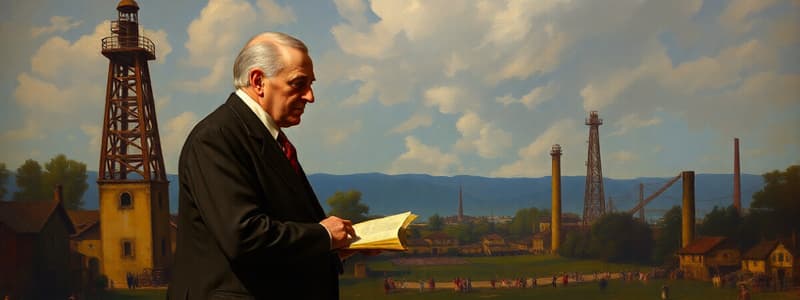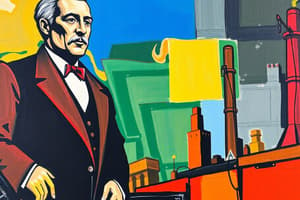Podcast
Questions and Answers
Which of the following industries contributed significantly to the wealth of prominent businessmen and job creation in America during the 1870s?
Which of the following industries contributed significantly to the wealth of prominent businessmen and job creation in America during the 1870s?
- Automobiles, aviation, and telecommunications
- Banking, real estate, and retail
- Oil, railroads, steamships, and steel (correct)
- Agriculture, textiles, and mining
Before the invention of automobiles, oil was exclusively used for producing gasoline.
Before the invention of automobiles, oil was exclusively used for producing gasoline.
False (B)
What did the Seneca Indian tribe call the dark, oily substance they discovered floating on ponds and streams in what is now New York State?
What did the Seneca Indian tribe call the dark, oily substance they discovered floating on ponds and streams in what is now New York State?
Rock oil
In 1855, oil was refined into a usable ______ and heating solution, marking a significant milestone in its utilization.
In 1855, oil was refined into a usable ______ and heating solution, marking a significant milestone in its utilization.
What was John D. Rockefeller's primary strategy for minimizing distribution costs for Standard Oil?
What was John D. Rockefeller's primary strategy for minimizing distribution costs for Standard Oil?
John D. Rockefeller's business practices were universally praised for their ethical and fair approach.
John D. Rockefeller's business practices were universally praised for their ethical and fair approach.
Besides being a successful businessman, what other significant activity did John D. Rockefeller engage in throughout his life?
Besides being a successful businessman, what other significant activity did John D. Rockefeller engage in throughout his life?
Which of the following companies did Cornelius Vanderbilt NOT have a leadership role in?
Which of the following companies did Cornelius Vanderbilt NOT have a leadership role in?
Cornelius Vanderbilt transitioned his business from local steamboats to ocean-faring steamships primarily as a result of the ______ boom.
Cornelius Vanderbilt transitioned his business from local steamboats to ocean-faring steamships primarily as a result of the ______ boom.
During the Civil War, Cornelius Vanderbilt supported the Confederate Navy by providing them with ships and resources.
During the Civil War, Cornelius Vanderbilt supported the Confederate Navy by providing them with ships and resources.
What was the primary reason behind the criticism and negative perception of Cornelius Vanderbilt, leading to him being labeled a 'robber baron'?
What was the primary reason behind the criticism and negative perception of Cornelius Vanderbilt, leading to him being labeled a 'robber baron'?
At what age did Andrew Carnegie's family immigrate to the United States from Scotland?
At what age did Andrew Carnegie's family immigrate to the United States from Scotland?
What early employment opportunity did Andrew Carnegie undertake to support his family upon immigrating to America?
What early employment opportunity did Andrew Carnegie undertake to support his family upon immigrating to America?
Andrew Carnegie primarily acquired his extensive knowledge and education through formal schooling and university degrees.
Andrew Carnegie primarily acquired his extensive knowledge and education through formal schooling and university degrees.
In 1853, Andrew Carnegie started working for the Pennsylvania Railroad Company as a secretary and ______ operator.
In 1853, Andrew Carnegie started working for the Pennsylvania Railroad Company as a secretary and ______ operator.
Which of the following materials constituted the primary product and source of wealth for Andrew Carnegie's business empire?
Which of the following materials constituted the primary product and source of wealth for Andrew Carnegie's business empire?
Andrew Carnegie's business motto was centered around accumulating wealth and maximizing profits above all else.
Andrew Carnegie's business motto was centered around accumulating wealth and maximizing profits above all else.
How many libraries, schools, colleges, and universities received funding from Andrew Carnegie during his life?
How many libraries, schools, colleges, and universities received funding from Andrew Carnegie during his life?
Match the following individuals with their primary industry:
Match the following individuals with their primary industry:
Cornelius Vanderbilt's ferry service operated between ______ Island and Manhattan, New York.
Cornelius Vanderbilt's ferry service operated between ______ Island and Manhattan, New York.
Flashcards
What is Oil?
What is Oil?
The substance from which gasoline is made, used for every machine before automobiles.
Who is a Philanthropist?
Who is a Philanthropist?
A person who gives money to help worthy causes, such as schools and hospitals.
What is Standard Oil?
What is Standard Oil?
An American oil company formed in 1870 by John D. Rockefeller. It controlled over a quarter of American oil refining within two years.
Who was Cornelius Vanderbilt?
Who was Cornelius Vanderbilt?
Signup and view all the flashcards
What is the Isthmus of Panama?
What is the Isthmus of Panama?
Signup and view all the flashcards
Who was Andrew Carnegie?
Who was Andrew Carnegie?
Signup and view all the flashcards
Study Notes
America's Booming Business (1870s)
- The 1870s saw burgeoning business activity.
- Prominent businessmen built up and dominated major American industries.
- Oil, railroads, steamships, and the steel industry generated immense wealth for these men.
- These industries created thousands of jobs for the American workforce.
Oil
- Before automobiles, oil was essential for every machine.
- Oil is the substance from which gasoline is derived.
- The Seneca Indian tribe discovered a dark, oily substance, "rock oil," floating on ponds and streams in what is now New York State.
- This "rock oil" was sold as a tonic for almost 200 years.
- Later, wells were dug to extract more oil.
- By 1855, oil was refined into a usable lighting and heating solution.
- Oil became a valuable commodity after its discovery, and oil wells were drilled nationwide.
- In 1870, John D. Rockefeller established and led the first major American oil company.
- Within two years, Rockefeller's Standard Oil controlled over a quarter of all American oil refining.
- Rockefeller secured deals with railroad companies to reduce distribution costs.
- He was a hard worker and consistent giver, due to his upbringing.
- Throughout his life, Rockefeller donated at least ten percent of his income to his church.
- He gave large sums of money to various organizations.
- Rockefeller's philanthropy greatly benefited schools, colleges, hospitals, and medical research.
- A philanthropist is someone who donates money to support worthy causes.
- Rockefeller had another side and reputation.
- His business practices were deemed highly controversial and were criticized
- Rockefeller possessed considerable power and did not always use it fairly.
Railroads
- Cornelius Vanderbilt was another American big businessman.
- He demonstrated significant business acumen from a young age.
- Vanderbilt started in the ferry service business in the 1800s at the age of 16.
- His ferry operated between Staten Island and Manhattan, New York.
- Vanderbilt expanded the business by acquiring steamboat competitors and taking over the management of railroads.
- In 1847, Vanderbilt took over the presidency of the Stonington Railroad Company.
- When the gold rush began in 1849, Vanderbilt transitioned from local steamboats to ocean-faring steamships.
- Vanderbilt's steamships transported people to California via the Isthmus of Panama.
- Passengers traveled across the isthmus by mule train or canoe.
- Vanderbilt’s Panama business thrived shipping both passengers and their gold.
- Vanderbilt aided the Union Navy during the Civil War.
- After the Civil War, Vanderbilt rebuilt his railroad empire.
- Vanderbilt's competition in the railroad industry improved service.
- Vanderbilt earned the reputation of a "robber baron."
- Vanderbilt's wealth and power were considered controversial.
Steel
- Andrew Carnegie was another prominent American businessman.
- He was born in Scotland in 1834.
- The Carnegie family emigrated to the US when Andrew was 13 years old.
- To support his family, Andrew worked in a factory as a bobbin boy when his family was poor.
- Andrew was a dedicated worker.
- Carnegie worked as a telegraph messenger boy and rose to become an operator.
- He acquired knowledge through reading.
- In 1853, at 18 years old, Andrew began working for the Pennsylvania Railroad Company.
- At the Pennsylvania Railroad Company he was a secretary and telegraph operator.
- He invested in the steel industry.
- Andrew recognized the value of steel as the steel industry expanded.
- He emerged as the most influential figure in the steel industry.
- Andrew owned the largest steel operation in the country.
- Steel was used to build railroad tracks, the framework for tall buildings, and bridge pilings and bonnets.
- Carnegie donated his money away, much like Rockefeller.
- More than 3,000 libraries, schools, universities received funding from Andrew Carnegie.
- Carnegie's mission was to donate money to deserving organizations.
Studying That Suits You
Use AI to generate personalized quizzes and flashcards to suit your learning preferences.



